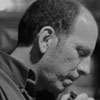Yo, Blues
Is Rap the Blues of the 90s?
By Ken Ficara
There are few better ways to start an argument among blues fans -- or, for that matter, among rock fans, country fans, or folk fans, or fans of just about any "white" music -- than to suggest that there's something more to rap music than noise. And further suggesting that rap may be closer to the original spirit of the blues than the blues itself nowadays leaves many blues fans too angry to speak coherently.
Why is that? What about rap music inspires such hatred among blues fans? And what about rap music could possible make it worth considering as the modern urban equivalent of blues?
It's been nearly thirty years since blues was a viable musical form among young black audiences. Many blues fans seem surprised that the audiences at most blues shows consist mostly of white men, but the actual surprise is that they'd think there was anything in the blues to interest the average urban youth, black or white.
How many of us still listen to the music our grandparents enjoyed? Is there any cachet attached to collecting old Louis Prima records? Do flocks of young white people go to Perry Como shows? If there were a Lawrence Welk boxed set, would it sell well among young whites? Of course not. So what connection could there be between a music that is rooted in the South and the black migration to the Northern cities after World War II, and the grandchildren of those migrants who wouldn't know a mojo from the Yazoo Delta railway? They've never seen a mule, they've never picked cotton, the only trains they've ever ridden are the Lexington Avenue subway and maybe Amtrak to visit their grandparents down South. What is there for them in the blues?
Alan Lomax's The Land Where the Blues Began charts the birth of the blues by examining the road gangs, the prisons, and the work farms of the Delta. You cannot tell the story of the blues without telling the story of the vicious oppression of the people who created it. Their music was a response to their situation, chronicling it as best as they could without suffering retribution.
When Lomax recorded Blues In the Mississippi Night, a landmark session where John Lee Williamson, Big Bill Broonzy and Memphis Slim talked very frankly about what life was like in the Jim Crow south, the three singers insisted that he release the record without their names on it. They were terrified that if their names were on the record, they would be killed by Southern whites.
When it was a living music, "respectable society" did not consider the blues "serious music." A revolution was in the making, chronicled by people with little or no understanding of the music or its significance. We must see the prime of people like Skip James, Charley Patton and Robert Johnson through the lens of ignorant white record company shysters who cared nothing about the music except for what profit it would bring them. It's as if the 1960s' entire recorded legacy consisted of audiotapes of the Dick Clark show.
Blues was ignorant music, simple music, the music of poor and uneducated people who had little, if any, formal musical training and were not making what was then considered "music." It also told the truth a little too starkly for most white people's taste.
Sounds a lot like rap in the 90s, doesn't it? Where did rap come from? While its roots are in Jamaican sound systems and toasting, rap as we think of it today came out of the South Bronx in New York City during the late 1970s. Most white New Yorkers first became aware of it when a song called "The Message," by Grandmaster Flash and the Furious Five, became a smash hit, the soundtrack of the summer of '82. Break dancing suddenly became commonplace, and there was a new culture called "hip hop" on the streets. "The Message" was by no means the first rap song, but its stark tale of a short and miserable ghetto boy's life stood out against the popular music of the time like a magic-marker message on the wall of the Met.
The music remained pretty much unknown outside the big cities for most of the early 80s. This was the era when MTV had to be publicly embarrassed into playing videos by black artists, only capitulating at last in the face of the millions of copies Michael Jackson's Thriller was selling every week. (And thanks to very public confrontations with artists ranging from Rick James to David Bowie.)
Rap was an alternative to Michael, and to the other commercialized and corporate "urban contemporary" music scene. It painted stark pictures of city life, ghetto life.
As rap has become more and more popular, it's been diluted by corporate executives to an assembly-line production of increasingly violent and sexist records. But the preponderance of bad rap shouldn't obscure the existence of the real thing, any more than the huge number of awful pop singles from the 1960s should cause us to dismiss the works of the Beatles or Marvin Gaye.
Rap chronicles the life of the people who are singing it the same way blues did the lives of blues singers. Public Enemy may not sound much like Robert Johnson, but there's as much blues in songs like "Night of the Living Baseheads" or "911 Is a Joke" as in "Love In Vain."
I can hear the purists screaming now. "How dare you compare Johnson to rap singers! They don't even sing! There's no music in rap!" Rap's focus is on rhythm and wordplay rather than melody and harmony, and people have been insulting African music on this basis for more than a century. Amiri Baraka describes the African emphasis on rhythms and polyrhythms and notes that "Because of this seeming neglect of harmony and melody, Westerners thought the music 'primitive.' It did not occur to them that Africans might have looked askance at a music as vapid rhythmically as the West's."
It seems that the mainstream American music scene has always taken a long time to accept and understand the music of African Americans. We have seen the same cycle so many times: A new form of African-American music emerges, and it's universally decried as "noise" or worse by most whites. They say it's ignorant, uneducated, and that "any idiot could do that." Thirty years later, whites are buying that same music in $50 boxed sets. This happened with blues, with ragtime, with bebop, with R&B and rock and roll, and now with rap.
In another ten or twenty years, middle-class whites will buy expensive boxed sets of rap music, with long essays describing how vital it was and how much it tells us about the horrible conditions of the American inner city in the late twentieth century. They will express shock at the things that white society did in the late 1900s to prompt such angry music, and they will comfort themselves that things are not that bad anymore. Meanwhile, they will turn their noses up at the newest black music which is expressing a different anger, created by a different situation.
"The most contemporary Negro music of the late fifties and sixties has again placed itself outside any mainstream consideration," Baraka wrote in 1963. "Also, many musicians hate and misunderstand what Coleman, Taylor, Coltrane and others are doing. ... Negro music is always radical in the context of formal American culture."
But the lack of acceptance has never hurt the music. Perhaps Miles Davis said it best in his autobiography:
A lot of old jazz musicians are lazy motherfuckers, resisting change and holding on to the old ways because they are too lazy to try something different. They listen to the critics, who tell them to stay where they are because it's what they like. The critics are lazy, too. They don't want to try to understand music that's different. The old musicians stay where they are and become like museum pieces, under glass, save, easy to understand, playing that tired old shit over and over again. Then they run around talking about electronic instruments and electronic musical voicing fucking up the music and the tradition. Well, I'm not like that ... If anybody wants to keep creating they have to be about change.
References:
- Davis, Miles: The Autobiography, Simon & Schuster, 1989
- Jones, LeRoi (Amiri Baraka): Blues People, Quill, 1963
- Lomax, Alan: The Land Where the Blues Began, Pantheon, 1993

